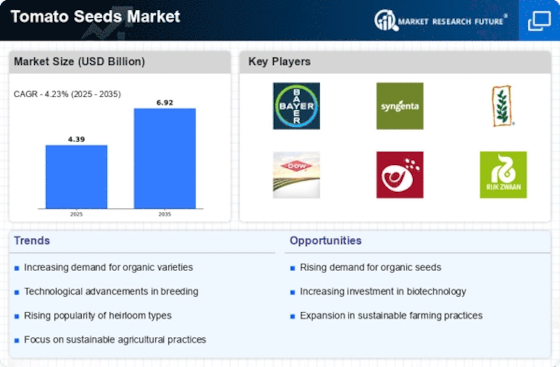Market Analysis
In-depth Analysis of Tomato Seeds Market Industry Landscape
The size and growth of the tomato seeds market are influenced by several key market factors that reflect the dynamics of the agricultural industry, technological advancements, consumer preferences, and global market trends.
One significant factor driving the market size of tomato seeds is the increasing demand for tomatoes as a staple food and as a key ingredient in various cuisines worldwide. Tomatoes are versatile and widely used in salads, sauces, soups, and other culinary applications, making them a staple in diets across the globe. As the global population continues to grow and dietary patterns evolve, there is a rising demand for tomatoes, driving the need for high-quality seeds that can produce disease-resistant, high-yielding tomato plants.
Moreover, the growing trend towards healthier eating habits and the increasing awareness of the nutritional benefits of tomatoes are driving the demand for specific types of tomato varieties. Consumers are increasingly seeking tomatoes that are rich in vitamins, antioxidants, and other beneficial nutrients. This trend is fueling the development and commercialization of specialty tomato varieties with enhanced nutritional profiles, such as heirloom tomatoes, cherry tomatoes, and high-lycopene tomatoes. As a result, there is a growing demand for tomato seeds that can produce these specialty varieties, driving market growth.
Furthermore, advancements in seed breeding and biotechnology are driving innovation in the tomato seeds market, enabling the development of new and improved tomato varieties with desirable traits such as disease resistance, high yield potential, and improved shelf life. Plant breeders are leveraging advanced breeding techniques, such as marker-assisted selection and genetic engineering, to accelerate the development of superior tomato varieties that meet the evolving needs of growers, processors, and consumers. These technological advancements are expanding the range of options available to tomato growers and driving market growth by providing solutions to key challenges such as disease pressure, climate variability, and market demands.
Additionally, climate change and environmental concerns are shaping the market for tomato seeds, driving the demand for tomato varieties that are adapted to changing climatic conditions and sustainable farming practices. Climate variability, including extreme weather events, droughts, and temperature fluctuations, can impact tomato production by affecting yields, quality, and susceptibility to pests and diseases. As a result, there is a growing need for tomato seeds that are bred for resilience and adaptability to withstand environmental stressors and minimize the environmental impact of tomato cultivation. Sustainable farming practices, such as integrated pest management, organic production methods, and water-efficient irrigation techniques, are also driving the demand for tomato seeds that support environmentally friendly agriculture.
Moreover, globalization and the expansion of international trade are influencing the tomato seeds market by creating opportunities for seed companies to access new markets and expand their customer base. The increasing demand for tomatoes in emerging markets, coupled with growing urbanization and changing dietary habits, is driving the need for high-quality tomato seeds that can produce marketable tomatoes with desirable attributes such as flavor, color, and shelf life. As a result, seed companies are investing in research and development to develop tomato varieties that are well-suited to the specific growing conditions and market preferences of different regions around the world.
Furthermore, regulatory factors, such as intellectual property rights, plant breeder's rights, and phytosanitary regulations, also influence the tomato seeds market by governing the protection, distribution, and trade of tomato seeds. Intellectual property rights, including patents and plant variety protection, incentivize investment in seed research and development by granting breeders exclusive rights to commercialize new tomato varieties. Plant breeder's rights provide legal protection for plant breeders' intellectual property and enable them to recoup their investment through royalties and licensing fees. Phytosanitary regulations govern the movement of tomato seeds across borders to prevent the spread of pests and diseases, ensuring the biosecurity of tomato production systems.


















Leave a Comment